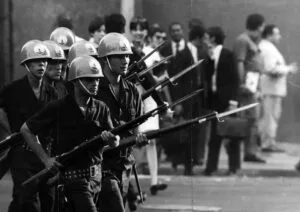The Brazilian transition from the civil-military dictatorship to the New Republic in the 1990s could have been a period to revise the authoritarianism embedded in the country’s society since its formation. However, the authoritarian traits – boosted during the dictatorship – are legacies Brazil has to this day.
Behind these traits, there is a society and successive governments that refuse to come to terms with the past. President Luiz Inácio Lula da Silva (Workers’ Party) has recently said he cannot “always dwell” on the dictatorial past. The comment was in response to being asked about the cancellation of the ceremony to mark the 60th anniversary of the 1964 coup, planned for April 1st this year.
“What I cannot do is not move forward with [Brazil’s] history. I cannot always dwell on it, that is, it’s a part of Brazil’s history about what we still lack information about since there are still missing people, things to be investigated. But, honestly, I will not dwell on it. I’ll try to move this country forward,” said Lula in an interview with the Brazilian TV show É Notícia.
Ivo Lebauspin, who was arrested and tortured during the dictatorship, says “It’s an error not to elaborate on the dictatorship period. There is a narrative saying it’s better to reconcile with the past and forget what happened. That’s impossible to achieve without knowing what really happened.”
“Some people think that, in order to move forward with a political plan, it’s necessary to sweep [the dictatorship] under the carpet, put all this behind us, look ahead and make agreements. It was already done. It has been done for years. The dictatorship hasn’t been analyzed since its end [1985]. No trials, nothing,” he explained.
Lebauspin associates the military presence in the coup attempt to keep Jair Bolsonaro (Liberal Party) in the presidency as a remnant of the military intervention. “It has everything to do with not remembering the dictatorship and not bringing it to justice. In Germany, there is a monumental effort to constantly remember what happened. There are Holocaust museums in various places, and people know what happened. There was a trial, facts were analyzed and judged. There was no such thing here.”
Similarly, Daniel Aarão Reis Filho, a professor in the History Department at Fluminense Federal University (UFF, in Portuguese), says that he remembers “leaders of progressive parties, like Tancredo Neves in 1985, calling on people not to look in the rear-view mirror, but to look ahead and not dwell on the wounds.” That shows that Brazil “paid little attention to reflecting on the state structure set up during the dictatorship and its policies.”


